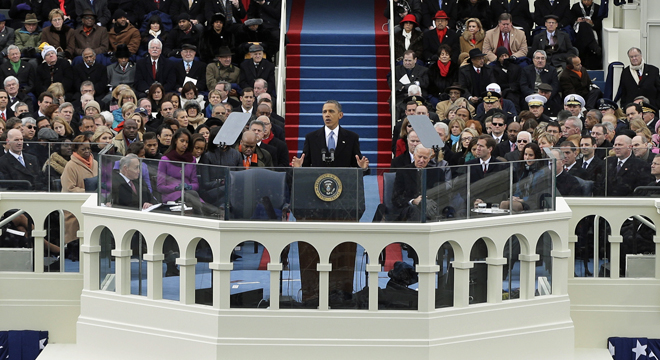In the days following his re-election, in a manner reminiscent of his candidacy in 2008, President Obama called publicly for an end to divisive politics. But he’s governed much more aggressively in the past months than he did in early 2009 — battle hardened by two years of trench warfare with his adversaries in the GOP — securing the first progressive income tax increase in nearly two decades, and using the power of presidential persuasion to tame angry Republicans before they could threaten his second term with more dangerous brinksmanship.
His second inaugural address captured that spirit of muscular liberalism to a much greater extent than it resorted to bromides about the end of partisanship. In addition to being the most progressive speech of his national political career, it also characterized liberal goals and ideals as more than political ambitions but as essential requirements of American citizenship.
“We, the people, declare today that the most evident of truths-that all of us are created equal-is the star that guides us still; just as it guided our forebears through Seneca Falls, and Selma, and Stonewall,” Obama said, referring to defining moments in the suffrage, civil rights, and gay rights movements of the past century.
“[O]ur journey is not complete until our wives, our mothers, and daughters can earn a living equal to their efforts. Our journey is not complete until our gay brothers and sisters are treated like anyone else under the law – for if we are truly created equal, then surely the love we commit to one another must be equal as well. Our journey is not complete until no citizen is forced to wait for hours to exercise the right to vote. Our journey is not complete until we find a better way to welcome the striving, hopeful immigrants who still see America as a land of opportunity; until bright young students and engineers are enlisted in our workforce rather than expelled from our country. Our journey is not complete until all our children, from the streets of Detroit to the hills of Appalachia to the quiet lanes of Newtown, know that they are cared for, and cherished, and always safe from harm.”
Obama thus used his inaugural address to cast ongoing fights for pay equity, equal rights, immigration reform, and gun restrictions, and against voter disenfranchisement, not just as his goals for the next four years but as essential to the perfection of the union.
To make headway on those goals, President Obama will have to confront in his second term the same opposition he’s faced for four years, bruised by a failed effort to thwart his re-election. And he used the occasion to remind his political nemeses that the election settled a host of disagreements, for the time being at least, and thus cleared the way for the two parties to address different challenges.
“[W]e reject the belief that America must choose between caring for the generation that built this country and investing in the generation that will build its future,” Obama said-a poetic rendering of his campaign call to both preserve the structure of the country’s retirement security programs, and to fortify and promote investments for the current generation of students and workers. “[W]e remember the lessons of our past, when twilight years were spent in poverty, and parents of a child with a disability had nowhere to turn. We do not believe that in this country, freedom is reserved for the lucky, or happiness for the few. We recognize that no matter how responsibly we live our lives, any one of us, at any time, may face a job loss, or a sudden illness, or a home swept away in a terrible storm.”
He at times threw sharp rhetorical elbows, singling out the right for its stridency and its reactionary views.
On the social safety net, Obama argued: “The commitments we make to each other-through Medicare, and Medicaid, and Social Security-these things do not sap our initiative; they strengthen us. They do not make us a nation of takers; they free us to take the risks that make this country great.”
On climate change, Obama promised: “We will respond to the threat of climate change, knowing that the failure to do so would betray our children and future generations,” he said, challenging conservatives who have either denied the existence of global warming, or rejected efforts to address it. “Some may still deny the overwhelming judgment of science, but none can avoid the devastating impact of raging fires, and crippling drought, and more powerful storms.”
The goals he articulated will require a mix of political leadership, legislative action, and citizen engagement. Some of them will cost money. And to realize them, Obama subtly called upon the right to abandon its anti-tax dogma, criticizing people of strong beliefs who characterize extreme tactics as synonymous with commitment to purpose.
“We cannot mistake absolutism for principle, or substitute spectacle for politics,” Obama said, “or treat name-calling as reasoned debate.”
Obama spoke in his second inaugural before a diminished, but still sprawling crowd stretching west from the Capitol toward the Washington Monument. He was flanked by dignitaries, celebrities, and members of Congress, many of whom seemed awestruck by the scale of the event.
“This is the 57th inauguration of an American president,” said Sen. Chuck Schumer (D-NY), who chaired the inaugural events. “And no matter how many times one witnesses this event, its simplicity, its innate majesty, and most of all its meaning-that’s sacred yet cautious in trusting of power, from we the people to our chosen leader-never fails to make one’s heart beat faster.”










